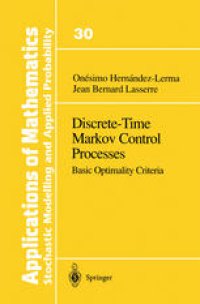
Ebook: Discrete-Time Markov Control Processes: Basic Optimality Criteria
- Genre: Mathematics // Automatic Control Theory
- Tags: Probability Theory and Stochastic Processes
- Series: Applications of Mathematics 30
- Year: 1996
- Publisher: Springer-Verlag New York
- Edition: 1
- Language: English
- pdf
This book presents the first part of a planned two-volume series devoted to a systematic exposition of some recent developments in the theory of discrete-time Markov control processes (MCPs). Interest is mainly confined to MCPs with Borel state and control (or action) spaces, and possibly unbounded costs and noncompact control constraint sets. MCPs are a class of stochastic control problems, also known as Markov decision processes, controlled Markov processes, or stochastic dynamic pro grams; sometimes, particularly when the state space is a countable set, they are also called Markov decision (or controlled Markov) chains. Regardless of the name used, MCPs appear in many fields, for example, engineering, economics, operations research, statistics, renewable and nonrenewable re source management, (control of) epidemics, etc. However, most of the lit erature (say, at least 90%) is concentrated on MCPs for which (a) the state space is a countable set, and/or (b) the costs-per-stage are bounded, and/or (c) the control constraint sets are compact. But curiously enough, the most widely used control model in engineering and economics--namely the LQ (Linear system/Quadratic cost) model-satisfies none of these conditions. Moreover, when dealing with "partially observable" systems) a standard approach is to transform them into equivalent "completely observable" sys tems in a larger state space (in fact, a space of probability measures), which is uncountable even if the original state process is finite-valued.
This book provides a unified, comprehensive treatment of some recent theoretical developments on Markov control processes. Interest is mainly confined to MCPs with Borel state and control spaces, and possibly unbounded costs and non-compact control constraint sets. The control model studied is sufficiently general to include virtually all the usual discrete-time stochastic control models that appear in applications to engineering, economics, mathematical population processes, operations research, and management science. Much of the material appears for the first time in book form.
This book provides a unified, comprehensive treatment of some recent theoretical developments on Markov control processes. Interest is mainly confined to MCPs with Borel state and control spaces, and possibly unbounded costs and non-compact control constraint sets. The control model studied is sufficiently general to include virtually all the usual discrete-time stochastic control models that appear in applications to engineering, economics, mathematical population processes, operations research, and management science. Much of the material appears for the first time in book form.
Content:
Front Matter....Pages i-xiv
Introduction and Summary....Pages 1-12
Markov Control Processes....Pages 13-21
Finite-Horizon Problems....Pages 23-42
Infinite-Horizon Discounted-Cost Problems....Pages 43-73
Long-Run Average-Cost Problems....Pages 75-124
The Linear Programming Formulation....Pages 125-167
Back Matter....Pages 169-216
This book provides a unified, comprehensive treatment of some recent theoretical developments on Markov control processes. Interest is mainly confined to MCPs with Borel state and control spaces, and possibly unbounded costs and non-compact control constraint sets. The control model studied is sufficiently general to include virtually all the usual discrete-time stochastic control models that appear in applications to engineering, economics, mathematical population processes, operations research, and management science. Much of the material appears for the first time in book form.
Content:
Front Matter....Pages i-xiv
Introduction and Summary....Pages 1-12
Markov Control Processes....Pages 13-21
Finite-Horizon Problems....Pages 23-42
Infinite-Horizon Discounted-Cost Problems....Pages 43-73
Long-Run Average-Cost Problems....Pages 75-124
The Linear Programming Formulation....Pages 125-167
Back Matter....Pages 169-216
....